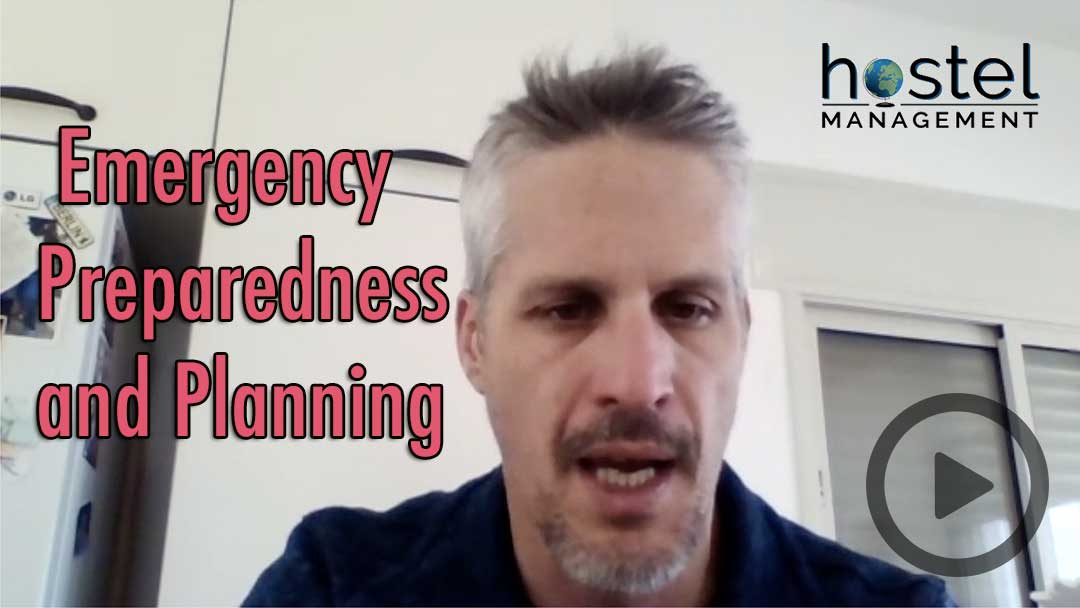It has been said many times before: it is not “if” a situation arises, but “when”. How do good leaders prepare for crisis? They respond rather than react to disaster, the difference between the two is in preparation and being proactive.
This month, I spoke with Gal Mor, of Abraham Hostels in Israel. We discussed travel and violence. Specifically, I wanted to know how to he deals with the physical aspect of periodic political unrest in his country and the protocols he has in place for violent events. And the psychological aspect of fear that affects how travelers respond to news of violent events. How does he keep his current guests calm and encourage future guests?
Israel is no stranger to violent acts of protest and military conflict. And the media love to swirl stories of violence with minute bits of fact dropped in between threads of bias and sensational photos through our social news feeds- because that sells papers. The event may only affect a small portion of Israel, but these news stories hurt Israel’s public relations and public image; they give the impression that Israel as a whole is unsafe.
Luckily, backpackers tend to be modern day pioneers; they are the ones to forge ahead- continuing to go off the beaten path, scrutinise travel warnings, and prove the naysayers wrong. That said, while backpackers tend to be a bold breed, they do have legitimate concerns when bombs are exploding nearby, and their families back home are often biting their fingernails waiting for a phone call from their “stubborn” child.
Communication
Communication is key. Keeping staff informed of events so they know how to handle guest questions helps to ease tensions. Thus, the guests are better equipped to make decisions about their travels, and can relay information back to their probably misinformed families back home.
Gal explained that if there is an urgent situation arising, they gather all of the guests together in a basement or common area and have a Hostel Talk.
What they include in the talks:
- the event
- the background
- the next steps
Their staff make sure to gather all the info pertinent to the situation, and translate it, foremost into English, but other languages. *It may not be possible to translate into all languages represented by the guests present, but they will do their best. Then, they communicate to the guests and open the floor to Q&A.
Build Community
Staff at Abraham Hostels also strive to build community, both inside and out. It is important not to feel alone when something terrible is happening. So encouraging guests to dine together, to talk to one another, and maybe share a beer helps to quell anxious feelings. Even when the language is limited, a smile or a hug with someone also experiencing a scary event communicates that “you are one of us”.
Building community at Abraham hostels continues outside the hostel walls. Gal and his crew give back to the local community and encourage guests to interact with the local community.
Preparation
Gal believes the principles are the same with military conflict as with environmental disasters. Dealing with public hysteria, misinformation and how to continue managing the business along with managing the chaos brought about by outside forces is still a juggling act. But preparation keeps the insecurities and mayhem manageable. Preparation allows you to respond confidently to the situation, (even with shaky legs.)
He also encourages other owners to reach out for advice! Don’t try to just do it yourself. Gal is happy to offer help for anyone struggling with a difficult situation, so don't hesitate to contact him with questions.
*Special thanks to Bethany Boyd with Denali hostel in Alaska who asked how to translate emergency information into different languages. Gal and I discussed this and have had similar experiences.
1. Ask guests to help. I have not come across a guest not willing to help translate in an urgent situation. And if you need a larger document translated, no emergency, you can always ask a guest to translate in exchange for a discount or free night stay in the hostel. *at Pacific Tradewinds, we had a binder full of hostel rules translated into 30 or so languages all written by guests passing through.
2. Translation Apps- I have had many Chinese guests lately who have this wonderful app on their phones where you can just speak into the phone and it gives a written translation. Seems as accurate as the speech app on FB Messenger, provided you speak clearly. TBH if you like to travel, this is just a good thing to have in your phone anyway. See article here for a list of various options.
3. Google Translate- I know what you are thinking. You tried to translate: “Keep door free from obstruction” into Swedish, but Google gave you “Liberty guard door closed”; your Swedish guest looked at you like you lost your mind. Google has improved its translation a lot recently. It will definitely work in a pinch if you need to get urgent information to a guest. I have used it last year to explain complicated information about an approaching cyclone in French, and it worked a treat.
Thank you for watching. I know I am awkward as in these videos but hope you get something out of it despite that. Also, special thanks to Daniel Lyra for helping to edit the video.
:) Kat
If you would like to add some ideas to the pot, please comment in the section below.
And if you would like to keep following along in our health and safety month, feel free to click on the links below .



